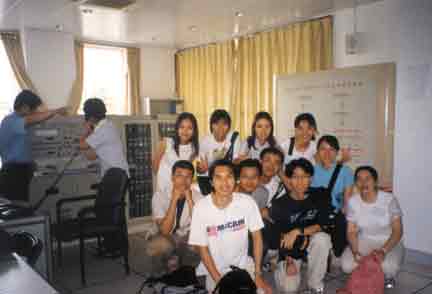Internships during a bad economy
By Kayu Wong

Hong Kong has suffered from an economic slump. Unemployment figures reached new highs earlier this year. The slump also affects student internship programs run by universities.
Prof. Kenneth Leung Wai Yin, associate professor in the School of Journalism and Communication at The Chinese University of Hong Kong, said, "Mass media firms are sparing less money for internship employment because of the gloomy economy. Looking for internship posts for students has become extremely difficult."
Prof. Tse Ching Yick, professor in the School of Hotel Management at The Chinese University of Hong Kong, agreed. "The hotel industry is sluggish. The hotel occupancy rate has been falling. Under the worsening situation, we did not request firms to increase the number of internship posts, but to maintain the existing level."
Both schools arrange summer internships for students.
The journalism internship program is a 1-credit, non-compulsory course provided for Year 2 students, whereas the program in hotel management is a no-credit module compulsory for Year 1 and 2 students.
Prof. Tse experienced frustration in arranging internships with private firms at first."As our program has only a 3-year history, it takes time for employers to get familiar with us. We have to put in great effort to convince them that our students are up to standard," Prof. Tse said.
According to Prof. Leung, keen competition among local tertiary institutions and from foreign students makes internship arrangements difficult. The decreasing number of internships also creates intense competition.
"Former students have built sound reputations in the minds of employers. Good quality performance is our bargaining power to ensure sufficient posts for our students," said Prof. Leung.
Payment for internships is also an issue. Wage cuts were an inevitable outcome. Prof. Leung explained, “Local companies have started to follow the American and European practice of not paying interns for their service. Currently, the salary for a internship in our industry is around $3,000 to $5,000 per month.
Besides internship programs offered by the two schools, work-study programs for engineering students are also affected by the economic downturn.
The work-study program in the Department of Electrical and Electronic Engineering at The University of Hong Kong is a non-compulsory, no-credit activity for Year 2 students.
Participants can work in a well-established company for a year to gain experience related to their study.
Afterwards, they can continue their degree program.Mr. Chui Po Ching, lecturer in the Department of Electrical and Electronic Engineering at The University of Hong Kong, said, "The department lowered the suggested monthly salary from $8,500 to $8,000 for work-study participants."
There is a similar work-study program in the Department of Electrical and Electronic Engineering at the Chinese University.
This year, four engineering students in the Chinese University were dismissed during training in a software company.
Miss Chan Sik Tuen, executive assistance of the department, said, “The U.S. headquarters of the company was severely affected by the September 11 attack.
"Therefore, they closed down the branch in Hong Kong.
"It had nothing to do with the students' work performance."
Since these four students could not continue their studies halfway through the semester, the department became responsible for allocating new jobs for them.
"We tried to match the vacancies in our work-study program with students' preference, but we failed," Miss Chan said.
"We finally found posts such as research assistants in our department for them with a monthly salary of $7,800, which is $700 less than their original jobs."
However, Miss Chan said the number of posts offered by private firms is increasing.
The Mandatory Provident Fund further affects the quality of internship jobs.
In the past, an internship usually lasted for three months.
However, internships nowadays do not last for more than two months in order to avoid firms’ paying into the Mandatory Provident Fund.
Under the Mandatory Provident Fund Schemes Ordinance, employers and employees both are taxed 5 percent of their monthly salary as MPF once the employment duration reaches 60 days. This adds extra financial burden and administration costs to employers.
"Private firms try to minimize costs whenever possible," said Prof. Leung of the the Chinese University.
He said, "Students take time to adapt to a new working environment."I hope that internship employment will be exempted from the ordinance in the near future."

Students Views on internning in China
By Leonie Wong
Courtesy of Emily Teng Emily Teng, top left, at underground reailway service in Shanghai.
Under the economic downturn and high unemployment rate in Hong Kong, people are looking
at career prospects in China. Many university students go to China for internships to prepare for their careers.The Chinese University of Hong Kong launched its China Career Development Award Programme in 1997. It provides students with summer workplace training or internships in China. There was a recording-breaking number of 848 applicants for the progamme this year.
Emily Teng is a Year 2 BBA student who took part in the programme last summer.
"I would like to look for a job in China when I graduate. Because China entered the World Trade Organization, job opportunities in China are great," she said.
She worked for the underground railway service for four weeks in Shanghai and attended seminars about the recent development of Shanghai. She said her experience was worthwhile.
"I think Hong Kong students are more open-minded. They also have a better international scope." She holds an optimistic view of Hong Kong students working in China.
The Computer Engineering and Information Technology Department of City University of Hong Kong introduced a similar China internship programme for its students in 2000. It is called the Industrial Attachment Scheme.
The number of partner companies joining the programme rose from 7 to 45 this year.
Leung Yin Wah, a graduate of the department last year, was one of the participants in the Industrial Attachment Scheme. He worked as an engineer for Astec Power Supply in Shenzhen for two months.
He commented that this scheme was quite useful in enhancing his understanding of the working environment in China. His Mandarin also improved.
However, Mr. Leung felt that working in China may not be as good as one might expect.
"We lack experience to be the sophisticated management elite in China. And the competition with university students in China is great. They are actually more hardworking than us but ask for lower salaries."

